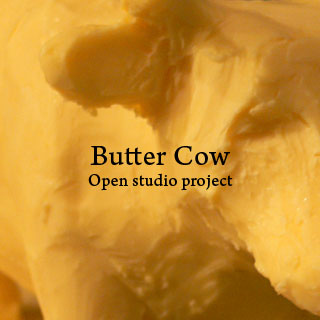Butter Cow

Carve : 2010.12.01 - 12.08
Melt : 2010.12.08 - 12.22
Open studio :
2010.12.08 / 12.22
Kuandu Museum of Fine Arts, Taipei, Taiwan
Supported by :
Taipei National University of The Arts
Kuandu Museum of Fine Arts
NOMURA FOUNDATION (JP)
Special Thanks : Duncan Mountford (UK)
Each Chinese character contains an imaginative landscape. "人 human" stands on two legs, and when the human opens wide his/her arms, it becomes "大 big/large". "木 tree" seems similar to "大 big/large" or "人 human", but if you look carefully you will see it is fixed on the ground.
To express the essential nature of things, the landscapes can be composed of complex groups of characters. Two trees will be "林 grove", three trees "森 forest". When "人 human" stays under the "木 tree", it will be "休 rest".
At the same time, there are different Chinese languages. Mandarin and Cantonese speakers pronounce the same Chinese character in different ways. In the Taipei MRT each station name is announced with four different Chinese pronunciations. As each Chinese character contains an imaginative landscape, I decided that these different combinations could form an interesting subject for the study of people's different perception of things.
I will produce a small sculpture of a cow made by carving blocks of butter. The inspiration for this work derives from the character combination for "butter" in Cantonese "牛油". Seperately, "牛" signifies "cow", and "油" signifies "oil". Thus, butter is "cow-oil".
(Taiwanese, "奶油 milk-oil" / Mandarin, "黄油 yellow-oil")
Encountering this character-combination caused me to look at butter in a slightly different way, a shift in perception caused by being in Taiwan.
![]()
Video work "The ten images of Butter Cow"
(color / 06'28" / no language / no subtitle / 2011)
Extra info [Butter]
The word butter derives (via Germanic languages) from the Latin "butyrum", which is the romanization of the Greek "βούτυρον" (bouturon). This may have been a construction meaning "cow-cheese", from "βοῦς" (bous), "ox, cow" + "τυρός" (turos), "cheese", but perhaps this is a false etymology of a Scythian word.
[From Wikipedia, the free encyclopedia]
.jpg) |
.jpg) |
.jpg) |
.jpg) |
.jpg) |
.jpg) |
.jpg) |
.jpg) |
.jpg) |
.jpg) |